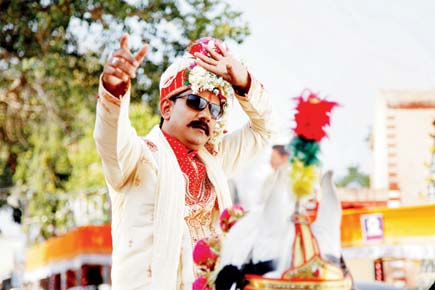Jaundya na Balasaheb (Let it Be, Balasaheb, Marathi), directed by Girish Kulkarni, that opens this weekend, is a feisty celebration of old-fashioned innocence, of jewels in the dust in your own backyard


Girish Kulkarni, director-writer of Jaundya na Balasaheb, also plays its protagonist Balasaheb
 Jaundya na Balasaheb (Let it Be, Balasaheb, Marathi), directed by Girish Kulkarni, that opens this weekend, is a feisty celebration of old-fashioned innocence, of jewels in the dust in your own backyard. With Kulkarni as debut director, this film is the latest in a long tradition of sensitive, thought-provoking Marathi films since V Shantaram.
Jaundya na Balasaheb (Let it Be, Balasaheb, Marathi), directed by Girish Kulkarni, that opens this weekend, is a feisty celebration of old-fashioned innocence, of jewels in the dust in your own backyard. With Kulkarni as debut director, this film is the latest in a long tradition of sensitive, thought-provoking Marathi films since V Shantaram.
ADVERTISEMENT
Girish Kulkarni exploded on the national scene when his film Deool won three national awards in 2012, including Best Film; with Kulkarni winning for Best Actor and Best Screenplay (dialogues) for the same film, a rare combination of skills. The film was, of course, directed by his longtime collaborator Umesh Kulkarni. The two Kulkarnis have been Marathi cinema’s winsome pair. Girish Kulkarni has written four films that Umesh Kulkarni has directed, including Valu, Vihir, Deool, and Highway: Ek Selfie Aarpaar. Girish Kulkarni is also an accomplished actor, working in over a dozen films, mostly Marathi, but also in Ugly, and now Dangal. In Jaundya na Balasaheb, he juggles three roles, as director, writer and protagonist.
A political satire and a comedy, Jaundya na Balasaheb explores the transformative power of art. Its cast includes Girish Kulkarni, Sai Tamhankar, Mohan Joshi, Reema Lagoo and Manava Naik. Balasaheb Marne (Kulkarni) is a loutish, SUV-type, entitled son of a corrupt rural politician, who is transformed by watching an experimental play in Pune. He has a spat with his father, leaves home and puts on a play with his friends. In the process, he learns a few life lessons about the value of true friends and even finds love. Significantly, the only well-read character, the playwright Jeevan, is a dark, low caste, who spurs on this transformation.
There have been many films before on the transformative power of art and theatre, from Hamlet and the Oscar-winning The Lives of Others, to Rang de Basanti. Marathi theatre has been at the forefront of experimental Indian theatre, and an instrument of social reform, so it is significant that Kulkarni uses a play within a film. Moreover, it is natural that filmmakers making meaningful films are tempted to go mainstream, in order to reach a larger audience; Sairat being another example. Kulkarni fires on all eight cylinders, couching his ideas with “kadak” mainstream songs, including the zinging Dolbywalya, Bring it On and Mona Darling. The film is coproduced by Arbhaat Nirmitee (Umesh Kulkarni-Girish Kulkarni), Saarrthi Entertainment and Ajay-Atul Productions (the music composers), backed by Zee Studios. Naturally, music is a major driver, and covers a range, from the zinging Dolbywalya (trademark Ajay-Atul), to traditional Maharashtrian Gondhal to Mona Darling (big band, swing music).
Kulkarni puts on a reliably superb performance, as do the ensemble cast, including Bhau Kadam and Shrikant Yadav. The script revolves around the idea of art transforming life, but this transformation is a bit sudden, with the watching of an experimental play swiftly turning bad guys into good guys. There are distracting sub-plots, the climax is somewhat stretched, and it’s a bit much that Mona Darling is a metaphor for your inner self. The big band Westernised music jars in a film commenting on political corruption, rural land grab and milk cooperatives. Still, the film is elevated by uproarious comedy, as well as vitriolic satire, as Balasaheb has the writing of intellectuals Durga Bhagwat and Mahesh Elkunchwar read aloud to put him to sleep. And, rather than daring to call his protagonist Balasaheb, as a character asks him, ‘You must be doing something great, no, to be called that?’ Go see the film this weekend.
Meenakshi Shedde is South Asia Consultant to the Berlin Film Festival, award-winning critic, curator to festivals worldwide and journalist. Reach her at meenakshishedde@gmail.com
 Subscribe today by clicking the link and stay updated with the latest news!" Click here!
Subscribe today by clicking the link and stay updated with the latest news!" Click here!







